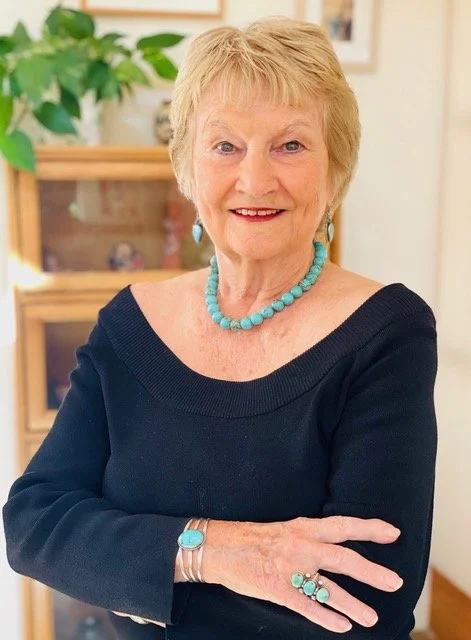About the Author
Author portrait by Brenda Kelly, Santa Fe, NM
Sandra Schackel grew up happily in the 1950s in a small, Midwestern town. Marrying and becoming a mom at age sixteen shaped her life over the next three decades. In their early twenties, her newly minted dentist husband joined the U.S. Army and the family departed for assignment to Wurzburg, Germany, in fall 1965.
European travel during the following three years led the high school graduate to experience a newfound artistic and cultural world open to her. Instinctively, she understood the need for higher education to better understand the world around her. On the family’s return to the States, she enrolled in her first college class as an uncertain but determined twenty-five-year-old. Cross-country Army moves from West Point, New York, to Kansas City, Missouri, to Fairbanks, Alaska, during the next ten years allowed her to continue the pattern of taking classes during the day while her three children were in school.
With each move, Sandy became more unhappy, feeling confined in a conventional marriage with no room for personal growth. Her gradual awareness of the burgeoning women’s movement brought a nagging feeling that perhaps there was another way to be married. But how? Scared of leaving the marriage and raising three children on her own without a college degree, her challenge seemed insurmountable. She pushed the idea of divorce to the back of her mind and dutifully played the role of the officer’s wife for one last tour of duty in Oklahoma.
However, by the time Schackel’s husband exited the Army in 1977 from Fort Sill, their traditional patriarchal marital arrangement had become visibly strained and they agreed to live apart for a semester. In separate cars that fall, they headed to new destinations in New Mexico. Their twenty-year marriage had collided with Sandy’s awareness of the evolving women’s movement of the 1960s and 1970s, leaving her unhappy and uncertain about their future.
Two years later, their relationship broke apart, and the couple divorced in late 1979. Realizing her newly won bachelor’s degree did not promise the monetary comfort she had expected with marriage, she promptly enrolled in graduate school at the University of New Mexico. By 1989, she had completed a Master’s degree and a PhD in American History and secured a tenure-track job at Boise State University. She was forty-six years old. Minda Honey in The Heartbreak Years explained her dilemma succinctly, “Our parents raised us to expect husbands; feminism taught us to want partners.”
Marriage and children had defined the first third of Schackel’s adult life, while life as a professor filled the second third. For the next twenty-three years, she taught classes in women’s history and Western American history, researching, writing, and publishing in the field. As an undergraduate, she had discovered the historic value and personal pleasure of using women’s oral history to provide content for three books, in addition to numerous articles and book chapters.
Her dissertation, published in 1992 by the University of New Mexico Press, Social Housekeepers: Women Shaping Public Policy in New Mexico, 1920–1940, earned the Border Regional Library Association Award for literary excellence in the cultural history of the Southwest.
In 2003, UNM Press published Western Women’s Lives: Continuity and Change in the Twentieth Century. This edited collection of essays documents the realities of Western women’s lives that extend far beyond the cliched “sun-bonneted pioneer woman,” the gendered myth of the West embedded in American culture.
Working the Land: The Stories of Ranch and Farm Women in the Modern American West appeared in 2011 from the University of Kansas Press. Here, the author narrows her gendered research beyond familiar male farmer accounts to oral histories of the “the farmer’s wife.” Along with stories from increasing numbers of single women farmers, her work gives power and voice to the long overlooked agricultural contributions of women throughout history.
Schackel retired from Boise State University in 2010 as Professor Emerita, returning to Santa Fe to enjoy the final third of her life with her children and grandchildren. Seeking fulfillment beyond family and volunteerism, the author joined a weekly memoir class in 2015. For the next several years, she engaged in writing short pieces that laid the foundation for this memoir. Happily, she discovered that, unlike academic writing, recording her personal history did not require footnotes!
The unexpected Covid-19 pandemic in 2020 provided the impetus to begin writing fulltime. Apron to Cap & Gown comprises all the joy, sorrow, hope, and disappointment that shaped many young marriages in twentieth-century America. More importantly, the memoir chronicles the courage, determination, and fortitude it took to challenge deeply entrenched marital beliefs in a period of shifting gender expectations. In doing so, Schackel, was able to create an identity for herself not available to that sixteen-year-old bride in 1958.
❦
Detail from mural at the Santiago E. Campos U.S. Courthouse, Santa Fe, New Mexico (Courtesy of Library of Congress)

